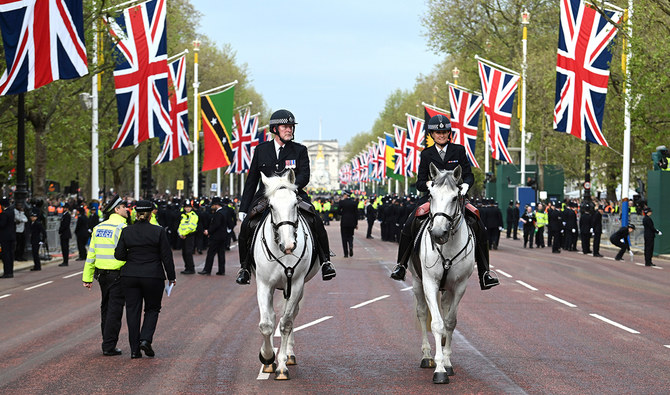LONDON: Charles III will be crowned king on Saturday in Britain’s biggest ceremonial event for seven decades, a sumptuous display of pageantry dating back 1,000 years.
Charles succeeded his mother Queen Elizabeth when she died last September and at 74, he will become the oldest British monarch to have the 360-year-old St. Edward’s Crown placed on his head as he sits upon a 14th century throne at London’s Westminster Abbey.
Watched by about 100 heads of state and dignitaries including US first lady Jill Biden, Charles follows 40 predecessors in being crowned at the abbey — which has staged all the coronations since William the Conqueror back in 1066.
His second wife Camilla, 75, will also be crowned queen during the two-hour ceremony which, while rooted in history, will attempt to present a forward-looking monarchy and nation.
“No other country could put on such a dazzling display — the processions, the pageantry, the ceremonies, and street parties,” Prime Minister Rishi Sunak said.
“It’s a proud expression of our history, culture, and traditions. A vivid demonstration of the modern character of our country. And a cherished ritual through which a new era is born.”
Despite Sunak’s enthusiasm, the coronation is taking place amid a cost of living crisis and public skepticism, particularly among the young, about the role and relevance of the monarchy.
Saturday’s event will be on a smaller scale than that staged for Queen Elizabeth in 1953, but will still aim to be spectacular, featuring an array of historical regalia from golden orbs and bejewelled swords to a sceptre holding the world’s largest colorless cut diamond.
By 7 a.m. (O600 GMT) the crowds along The Mall, the grand boulevard leading up to Buckingham Palace, were more than 20 people deep in some places.
Rachel Paisley, a 45-year-old housewife traveled from her home in Switzerland with her husband and two children.
“It is a moment in history. We wanted to be here to see it and create some memories,” she said next to her son, who was wearing a Charles face mask and her daughter, who sported a Union Jack head band.
After the service, Charles and Camilla will depart in the four-ton Gold State Coach that was built for George III, the last king of Britain’s American colonies, riding back to Buckingham Palace in a one-mile procession of 4,000 military personnel from 39 nations in ceremonial uniforms.
It will be the largest show of its kind in Britain since the coronation of Charles’ mother. Thousands are expected to line the streets and millions will watch at home and abroad.
Antonina Strain, 53, traveled from Toronto to be on The Mall, saying she had been born in London and coming back for the coronation was a once in a lifetime opportunity.
“I couldn’t imagine the United Kingdom without a monarch. It’s ingrained into the soul of the country.”
PROTESTS
At the start of ceremonies, Charles and Camilla will travel from Buckingham Palace to the abbey in the modern Diamond State Jubilee Coach, with the service due to begin at 1000 GMT.
They will pass cheering crowds but also what anti-monarchists say will be the biggest protest mounted by republicans. More than 11,000 police will be on duty ready to stamp out any attempted disruption.
Once at the abbey, much of the ceremony will feature elements that Charles’ forebears right back to King Edgar in 973 would recognize, officials said. Handel’s coronation anthem “Zadok The Priest” will be sung as it has at every coronation since 1727.
But there will be new elements, including an anthem composed by Andrew Lloyd Webber, famed for his West End and Broadway theater shows, and a gospel choir.
A Christian service, there will also be an “unprecedented” greeting from faith leaders and Charles’s grandson Prince George and the grandchildren of Camilla will act as pages.
However, there will be no formal role for either Charles’ younger son Prince Harry, after his high-profile falling out with his family, or his brother Prince Andrew, who was forced to quit royal duties because of his friendship with late US financier Jeffrey Epstein, a convicted sex offender.
Charles will swear oaths to govern justly and uphold the Church of England — of which he is the titular head — before the most sacred part of the ceremony when he is anointed on his hands, head and breast by Archbishop of Canterbury Justin Welby with holy oil consecrated in Jerusalem.
After Charles is presented with symbolic regalia, Welby will place the St. Edward’s Crown on his head and the congregation will cry “God save the King.”
His eldest son and heir Prince William will then pay homage, kneeling before his father, placing his hands between those of the king and pledging his loyalty as “your liege man of life and limb.”
ALLEGIANCE
Welby will call for all those in the abbey and across the nation to swear allegiance to Charles — a new element that replaces the homage traditionally sworn by senior dukes and peers of the realm.
However, that has caused controversy with anti-monarchist group Republic calling it offensive, forcing Welby to clarify it is an invitation not a command.
After returning to Buckingham Palace, the royals will make a traditional appearance on the balcony, with a fly-past by military aircraft.
Also in traditional British fashion, the weather in London could feature heavy bursts of rain, forecasters said, which could mean a slimmed down or even canceled fly-past.
Celebrations will continue on Sunday with nationwide street parties and a concert at the king’s Windsor Castle home, while volunteering projects will take place on Monday.
























